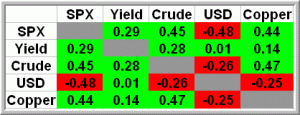
Intermarket Correlations
Quick: What do great symphonies, great novels, financial markets, and the conversations of clients and therapists have in common?
Answer: All follow distinctive themes. Much of the meaning that we find from all of them lies in our ability to track these themes across their many shifts and permutations.
A composer or novelist brings themes to life through the lines of different musical instruments or the story lines of various characters. Financial markets express themes of economic growth/weakness, inflation/deflation, and stability/instability through the movements across asset classes and national boundaries.
Such communication by themes is familiar to psychologists: What typically brings people to therapy is the fact that they are living out themes that aren’t of their choosing (and maybe not even within their awareness). A common example is the abused child that, later in life, finds herself distancing from relationships and fleeing from even normal, healthy financial risk-taking.
As I emphasized in a recent post, the dominant theme in recent market action (risk assumption vs. risk aversion) has been driven by global macro investment. We can see from the correlation matrix above, taken from my post, that a significant proportion of variance in the daily returns of stocks is shared with the U.S. dollar and commodities, as well as with 10-year Treasury yields.
After strong ISM data around 10:10 AM ET, we saw notable strengthening of the U.S. dollar against the Aussie dollar and euro, as well as a pullback in 10-year Treasury yields and a dip in oil prices. The confluence of this and subsequent market action suggested that global macro participants were firmly in control of market action, shifting from risk assumption to risk aversion.
Our job as traders and investors is to be the therapist, the concert aficionado, and the sensitive novel reader and track themes as they emerge and shift. If we view market action as a conversation, then we can appreciate that listening is a core investment skill.


What's been said:
Discussions found on the web: